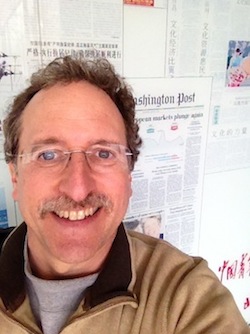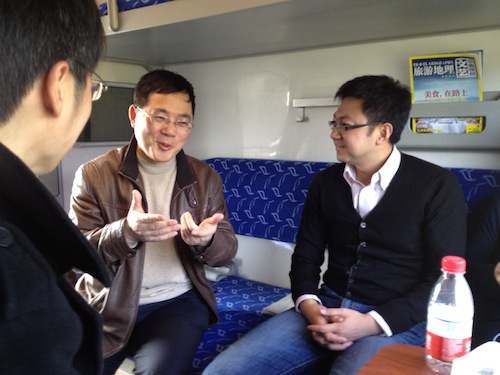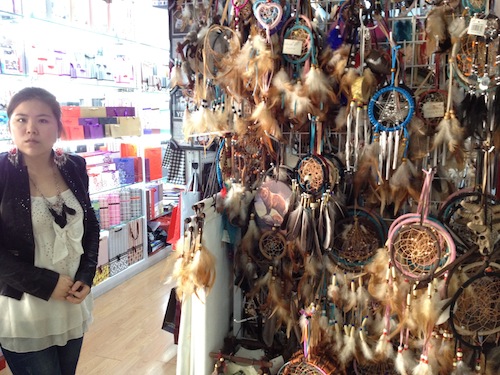06 AprJeremy Harris Lipschultz: A Midwestern Professor in China: yiwu
The 14-hour flight with views of the North Pole, Siberia and Mongolia offered plenty of time to reflect upon the distance between Omaha and Hangzhou, China. But, I also met new friends: Edward is a Chinese lawyer returning from his first visit to America. Jay is a senior biotech scientist in Austin returning for an academic conference in Beijing.
ZheJiang University City College in Hangzhou invited me to visit. I flew into Shanghai, a city with a metropolitan area of more than 20 million — about twice the size of what we Midwesterners find in the Chicago area. Dr. Jiankang Zhang and his student assistant “Kelly” were at the end of a line of greeters with roses for me. I slept for part of the two-hour drive to Hangzhou but awakened to see us trapped in a traffic jam just outside of town. The late afternoon sun is not so much setting, as it is fading into the murk.
I stayed on the sixth floor of professors’ apartments next to the student center on campus. My visitors went out of their way to prepare the apartment and make me feel a level of comfort in the culture. City College is a branch of the much larger main campus with about 15,000 students compared to more than 50,000 across all undergraduate and graduate fields. Obtaining exact numbers from China seems to be an exercise in false precision, but the estimates seem accurate. During a visit to the library, I learned that first-year students are not allowed to have computers, but they may be online following a successful academic year. Students, however, do have smart mobile phones. China Mobile has a shop on campus. An adjacent computer store sells iPads and other hardware.
My computer access was limited, of course, by the Great Firewall of China. No Facebook, Twitter or most other U.S. social media sites. I was able to use Gmail, but not the Google blogger sites, and I had no difficulty using Skype to talk with my wife. It was possible to follow Facebook and Twitter on my AT&T iPhone through an international plan, which was limited.
Hangzhou is a great place to see the clash of old and new in China. During the last decade, China’s GDP has skyrocketed at roughly 10 percent per year. I could not count the number of high-rise apartment buildings under construction, but I saw them on nearly every street around town. The construction dust, no doubt, contributes to the persistent haze, which gets worse as the day goes on. You can see examples of this in my Facebook photograph library.
My visitors took me to West Lake, a beautiful and historic area. It is considered one of the prettiest spots in the country. I saw tourist boats, a rowing team, and lots of visitors. My hosts pointed out the hotel where Richard Nixon stayed during his 1972 visit to Hangzhou.
After our walk around the lake, we head on foot toward an upscale tearoom for a traditional tea party lasting several hours. But it was the walk that really was filled with information. I saw a large billboard heralding Deng Xiaoping and his theories on the Chinese “socialist market economy.” Along the roadway, afternoon drive was happening on foot, bike, motorbike and car. We stopped at another local university, which featured a huge statue of Chairman Mao. Further down the road, we passed a police station. Two young men appeared to be being placed in a taxicab and sent home — at least, that was our speculation.
Beyond a complex of housing belonging to whom I was told were “peasant farmers,” was an impoverished area near a creek. You have to look closely to see poverty — behind, over or through cracks in strategically placed walls and vegetation — But it is there.

The next morning, we were up early for a two-hour “high-speed” (express) train ride to Yiwu. In the train car, we met a businessman and talk turns to manufacturing processes. Our group was shown the gleaming, Western style YOURWORLD International Conference Centre, and the China YiWu International Trade Mart. It reminded me of Chicago’s Merchandise Mart, although it seemed to be growing faster. Here, you can find not only goods from China, but also French wine, German appliances and African art. Yiwu also hosts the YOURWORLD International Conference Centre — a bright, three-year-old massive facility. Academics in China are training students to work in the trade show and exhibition industry.

In the nearby hills, a tourism business is growing around the Ming Dynasty and other historic and dynastic sites. These are used as sets by a growing movie industry proclaimed by most hosts as the Hollywood of China!
Before leaving Yiwu, I visited Dr. Zhang’s boyhood home. His parents live in a comfortable three-story duplex and own the adjacent property, renting out an upstairs apartment. Dr. Zhang’s Omaha photo with Warren Buffett is proudly displayed in the dining room. Dr. Zhang’s father is 70 and in good health. He is a retired carpenter and storeowner. As we prepared to leave, he locked his arm in mine and gave me a VIP walk down the alley and out of the residential area.
China, for me, remains a contrast between the old and new. Its more than one billion people are poised to be influential international players. Still, with so much growth so fast — it reminded me of Chicago 50 years ago, but on steroids. The challenge for the Chinese will be to sustain such rapid growth while transitioning to a cleaner environment over the next couple of decades. Clearly, Americans will be global partners is business and education.




